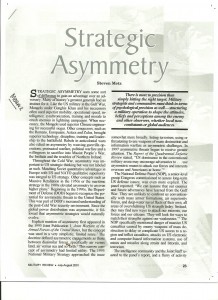Dr. Steve Metz was published on this topic by the Military Review in July-August 2001. A great deal of original thinking came out of the U.S. Army Strategic Studies Institute (SSI) in the aftermath of the 1998 Army Strategy Conference, and sadly, none of it has gained any traction with any Secretary of Defense (or State) since then. Should Senator Chuck Hagel (R-NE) actually be selected to be the new Director of National Intelligence (DNI), this is a concept he is going to have to integrate into his thinking.
Although Dr. Metz fully understands the asymmetry of will and touches on the asymmetry of morale, he does not address the core intelligence question of our century: the asymmetry of morality. Will & Ariel Durant understood this and highlighted the strategic value of being “in the right” in their capstone work, The Lessons of History. Others, including Buckminster Fuller in Critical Path and Dr. Robert Ackoff (see first link below), understood that context matters, and within context, morality and doing the right thing.
Morale is not the same as moral, and the “collateral advantage” that allows one to harness the distributed intelligence of the Whole Earth–to receive unsolicited warnings large and small, to receive unsolicited good ideas large and small–comes ONLY when one holds the moral high ground. It merits stressing that CONSENSUS is most easily achieved when those striving to achieve consensus share a common faith in integrity–in morality.
America is in the wrong today, because the US Government is imposing on both the domestic public and on humanity at large the wrong policies, the wrong programs, and the wrong acquisitions–as well as the wrong distribution of US taxpayer funds in the service of dictators, cartel leaders, and predatory immoral banks and businesses not at all interested in earning legal ethical profit fully compliant with true cost economics also known as the triple bottom line.
If the next DNI is to be successful, they must:
Continue reading “Reference: Strategic Asymmetry–with Comment”


